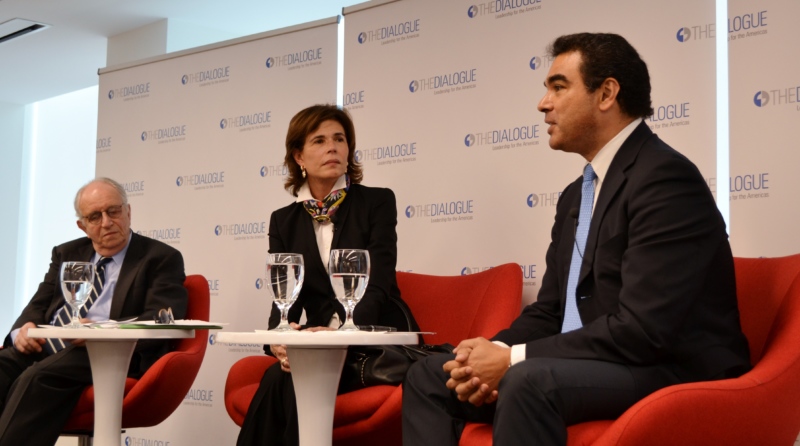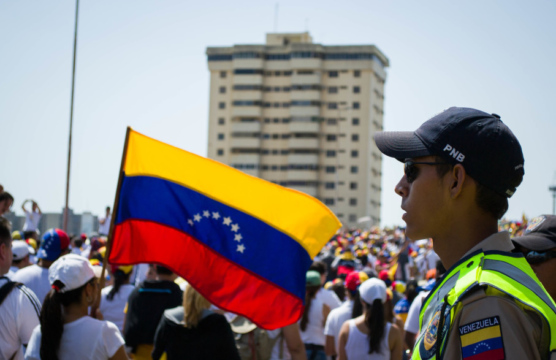A Fatal Blow to Democracy
Nicaragua is on the precipice.
On May 4, the Inter-American Dialogue hosted an event titled “Protests in Nicaragua: What’s Next?” moderated by Peter Hakim. The discussion featured Cristiana Chamorro from Fundación Violeta Chamorro and Manuel Orozco, Director of the Migration, Remittances & Development Program at the Inter-American Dialogue. Addressing the widespread demonstrations taking place in Nicaragua, the panelists discussed the causes of these protests as well as their future implications.
The street protests in Nicaragua are a culmination of shifting public sentiments and a rejection of political control by Nicaraguan President Daniel Ortega. Cristiana Chamorro commented that “Ortega’s monologue is broken” as Nicaraguans are no longer tolerating the human rights violations that have been allowed by one of the most corrupt governments in Latin America. Fed up with his “abuse of power,” a growing number of Nicaraguans believe that Ortega is unfit to lead the country. Student protesters, Nicaraguan youth, and others opposed to Ortega’s administration have been taking to the streets to denounce the political corruption and collusion with the private sector. Cristiana Chamorro noted that for the first time in ten years, advisors within the administration are criticizing the regime, revealing political divisions.
“One thing is for sure, Nicaragua is not the same as it was before April 2018.“ - @chamorrocris #ProtestsNicaragua pic.twitter.com/rI04bProwP
— The Inter-American Dialogue (@The_Dialogue) May 4, 2018
The increasing tensions are leading many to speculate on the re-democratization of Nicaragua and the end of Ortega's control. Cristiana Chamorro provided two scenarios in which this could happen: Ortega could anticipate leaving office through democratic and fair elections or he could leave “through the back door” as Anastasio Somoza did in 1979.
What’s next for Nicaragua? Chamorro and Orozco agreed that the shifting balance of power will lead to a national dialogue between key actors. This dialogue will need to review Nicaragua’s current political system and begin the process of strengthening democratic institutions and practices.
However, the dialogue will present unique challenges as there are multiple actors with varying agendas. The public voice mobilized by student and youth protestors in the street demands attention to human rights violations and an end to Ortega’s regime. The private sector wants a change in the country’s political institutions and peaceful, mediated transition to democratic practice. Based on its history of engagement with the government, Orozco predicted that the church will play significant role in the dialogues. Pressure from the international community calls for further investigation into human rights violations while protecting the rights of political opposition parties, journalists, and civil society activists. These groups, although aligned with a general goal of re-democratization, may have different priorities when it comes to setting a path forward for the country.
“The youth in Nicaragua has a key role because the demands they are making right now are legitimate. That will put a lot of pressure on Ortega.“ - @manuelorozco65 #ProtestsNicaragua pic.twitter.com/JmwXDWBoKZ
— The Inter-American Dialogue (@The_Dialogue) May 4, 2018
Another challenge is identifying who would be an appropriate and effective candidate to replace Ortega. Orozco noted that future leadership does exist within the country. “There is leadership in Nicaragua, but it’s not perfect,” he said. For one thing, the opposition needs to nurture and develop female political leadership. “The next leader of Nicaragua should be a young, single mother from Managua,” Orozco argued.
The panelists agreed that the future for Nicaragua is unclear. Even with international pressure and intervention, the political and social shifts the country needs will have to come from within, from the nation’s people and their consensus to end Ortega’s regime. “My trust is not in international pressure (…) it is mostly in the Nicaraguan people,” Cristiana Chamorro said, praising the organized movements in her country. She insisted that the international community should “keep having faith for Nicaragua, as the country is steering to a new situation.” Regarding the timeline of future events, Orozco stated that “in the short term, I don’t think there will be an election process in the next two years.” Although a political regime change may not occur immediately, Orozco predicted that “the [public] dissonance will continue to grow.” This dissonance that has been fueling the protests will continue to build momentum for institutional and structural change.
Nicaragua is on the precipice.
What will Ortega’s landslide victory allow him to do in his next term?
Events in the Ukraine have lifted the morale of anti-government protestors in Venezuela and elevated their expectations.
 Elizabeth Belair / Inter-American Dialogue
Elizabeth Belair / Inter-American Dialogue
